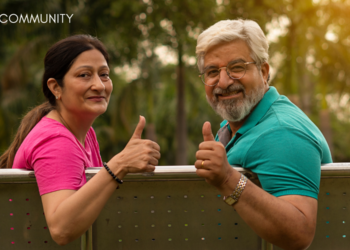Life is fluid, cyclical and circular, yet not every moment that we walk on earth is a promise we make to ourselves to create new memories with renewal of this life. Whether we make good memories or bad ones is a choice all of us have. Whether one is young or old, one stays with family or by themselves, it is important to stay connected. It is important to stay engaged. That is the only way to make friends with life. That is the only way to celebrate aging, as we grow old.
More and more people are living into very old age than ever before. Centenarians are commonplace today. Assuming that longevity trends hold, most of us can expect to live well into our eighth or ninth decade. In fact, if you ask a typical person how long he or she expects to live, the likely answer will be 85 years (almost two decades beyond our current average life expectancy).
The question of interest today has turned from “How long will I live?” to “If I’m going to live a long time, how can I be happy?”

Join Now >
From a practical point of view, it would seem that growing old portends misery, not happiness. However, in spite of the harsh realities of aging, we believe that old age is worthwhile. After all how we think about our day-to-day living shapes what it means to be happy. In psychology terms, this is called “positive aging”. The idea behind positive aging is that there are sources of happiness in our later years that are inherent in the process of growing old. In other words, positive aging is not how well we are able to dodge our infirmities, but rather, our ability to focus on what makes life worthwhile in our later years in spite of the physical or mental challenges that may arise. We all have known people who were born with the type of attitude that allowed them to grow old gracefully and get the most out of life right up to the end. For the rest of us, however, there are specific actions and habits of mind that we can learn, which, with focus and practice, can help the process of aging become a more positive experience. To grow old with a positive frame of mind, it is important to learn to take five basic actions:
Mobilize your resources
To make the most of your resources as you age, it is helpful to learn to be selective, optimize, and compensate. Older adults who are better at adapting to the aging process limit their options or life choices in order to optimize functioning as their faculties decline. As an example, at 80, the renowned concert pianist Arthur Rubenstein was still able to maintain a high level of performance by playing fewer pieces (selectivity), practicing those pieces more often (optimization), and masking his loss of motor speed by learning to slow the overall tempo of the piece, allowing him to contrast its fast and slow segments (compensation).
Make affirmative lifestyle choices
The challenge in life is not to avoid all bad choices, but to tip the scale of choices in favor of good ones. To increase the frequency of good choices and enhance your enjoyment of life as you age, it is important to understand what your life goals are and then make decisions based on those ideals. Other qualities that can help you lead a self-directed and fulfilling life as you age are:
- Knowing how to help or do for others and receive help in return.
- Honestly appreciating your place in the world and then choosing to make your contribution, however small, in that place.
- Knowing how to approach life with the hope of self-improvement or self-actualization, with an ongoing desire to learn new things and have new experiences.
Cultivate flexibility
Thinking outside the box is not just for youngsters. In fact, the science of aging has suggested that older adults may do this better than younger individuals can. The cultivation of flexibility involves lifelong strategies of thinking and feeling in ways that counteract maladaptive patterns of thinking embedded in regret, rigidity, self-absorption, chronic worry, and negativity.
Emphasize the positives
Positive aging is a way of perceiving life that construes growing old as meaningful and worthwhile regardless of the challenges that old age inevitably presents. In a sense, positive aging is as much a state of mind as it is any specific physical or mental condition. The essence of what it means to be happy and healthy in old age is to discipline yourself to reframe perceptions and cultivate positive emotions as you cope with the dilemmas of old age.
Stay intelligently engaged
As one ages, even if physically impaired, it is best to keep working, either in a job or as a volunteer. Take the example of Ustad Zakir Hussain, Late Pandit Ravi Shankar or our ex-President Late Dr. A. P. J. Abdul Kalam. What is common amongst these three personalities? Ok all three of them are famous and known for the great work they have done in their respective fields. However, there is one crucial aspect linking them and enabled them to reach where they have reached. They have stayed active and engaged throughout their lives. Each one of them had found a purpose in his life and stayed true to it.
Too much time spent with no purpose is often associated with unhappiness. So, stay busy! However not with only busy work or trivial pursuits, but with meaningful activities. Economists have coined the term unretirement to describe lot of people who retire, realize that they do not like staying retired, and go back to work. However we are not recommending all the elders to go back to work life. What we are underscoring is that in order to stay busy with meaningful activities one will require some strategies and re-shifting his/her priorities.
Take for example his holiness, Dalai Lama (age eighty-four). With growing age, he of course modified his work schedule to accommodate age-related slow down, but in the partial days when he works, he accomplishes more than most of his younger counterparts.
Many employers, including Samarth, these days allow senior citizen workers to modify their schedules in order to continue working. If you have read so far, we have reasons to believe that you are partially convinced to what we are suggesting. In order to implement the same with better efficiency, try to adopt the following smaller changes in your working schedules during your workdays:
- Incorporate reminders into your work day — written or verbal
- Divide large tasks into many smaller tasks and take breaks in between intense work shifts
- Request your employer or colleagues to provide additional training when there are workplace related changes
- Keep the workspace clutter-free as much as possible and encourage others to do so
- Reduce the number of hours worked per day or week. The idea is not to sit in office but spend productive time with colleagues
- If required and if possible request for changing the time of working hours that suits your active period during the day.
We also understand that for many of our readers, continuing to work in your job may not be possible after a certain age, as employers may still not be willing to hire older workers. However, there are still many ways to stay actively engaged in meaningful work. Few options are suggested below:
- Take an online class such as from Coursera or Khan Academy (but be sure you can interact to discuss what you have learned; learning in isolation can only go so far in keeping your mind active)
- Join (or host) a book club or current events discussion group e.g. Toastmasters
- Volunteer in a church or locality club
- If you have culinary skills then you may also want to take the help of your grandchildren to open a cloud kitchen
We at Samarth believe that when the student is ready, the teacher appears and the right teacher, the right believer in a child or an older adult (senior citizen), can tip the balance for that person’s life and help them to overcome life’s obstacles, to get on a track toward happiness and success that will lead them into successful aging. Let us embrace hope and happiness with open arms, let us stay connected and engaged, let us say hello to life









